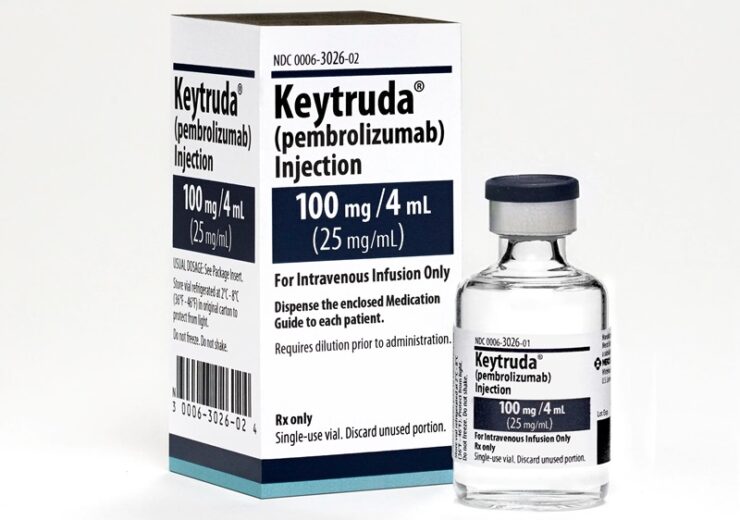The indicated use is for the initial treatment of adults diagnosed with locally advanced unresectable or metastatic human epidermal growth factor receptor 2 (HER2)-negative gastric or gastroesophageal junction (GEJ) adenocarcinoma

Keytruda operates as an anti-programmed death receptor-1 (PD-1) therapy. (Credit: Merck & Co., Inc., Rahway, NJ USA, and its affiliates)
Merck, referred to as MSD outside of the US and Canada, has announced that its Keytruda (pembrolizumab) plus chemotherapy has been approved by the US Food and Drug Administration (FDA) as a first-line treatment for adult gastric cancer patients.
The indicated use is for the initial treatment of adults diagnosed with locally advanced unresectable or metastatic human epidermal growth factor receptor 2 (HER2)-negative gastric or gastroesophageal junction (GEJ) adenocarcinoma.
The decision by the FDA is grounded in the findings from the Phase 3 KEYNOTE-859 trial. In this trial, the combination of Keytruda and chemotherapy demonstrated a 22% reduction in the risk of death (HR=0.78 [95% CI, 0.70‑0.87]; p<0.0001) compared to chemotherapy alone in this patient population.
The median overall survival (OS) was noted to be 12.9 months (95% CI, 11.9-14.0) for the Keytruda plus chemotherapy group, in contrast to 11.5 months (95% CI, 10.6-12.1) for those receiving chemotherapy alone.
KEYNOTE-859 stands as a multicenter, randomised, double-blind, placebo-controlled Phase 3 trial (ClinicalTrials.gov, NCT03675737), involving 1,579 patients with HER2-negative advanced gastric or GEJ adenocarcinoma who had not undergone systemic therapy for metastatic disease previously.
Patients with autoimmune diseases requiring systemic therapy within two years of treatment or those with medical conditions necessitating immunosuppression were deemed ineligible.
Keytruda operates as an anti-programmed death receptor-1 (PD-1) therapy, enhancing the body’s immune system to detect and combat tumour cells. This humanised monoclonal antibody impedes the interaction between PD-1 and its ligands, PD-L1 and PD-L2, thereby activating T lymphocytes with potential effects on both tumour cells and healthy cells.
Merck Research Laboratories senior vice president and late-stage oncology, global clinical development Dr Marjorie Green said: “At Merck, we have a comprehensive development program across a broad range of gastrointestinal cancers with the goal of providing meaningful new options to patients and their healthcare providers.
“This latest approval of a Keytruda-based treatment option is an important milestone for patients with advanced HER2-negative gastric or GEJ adenocarcinoma and reinforces Merck’s commitment to addressing the needs of these patients in the US.”
